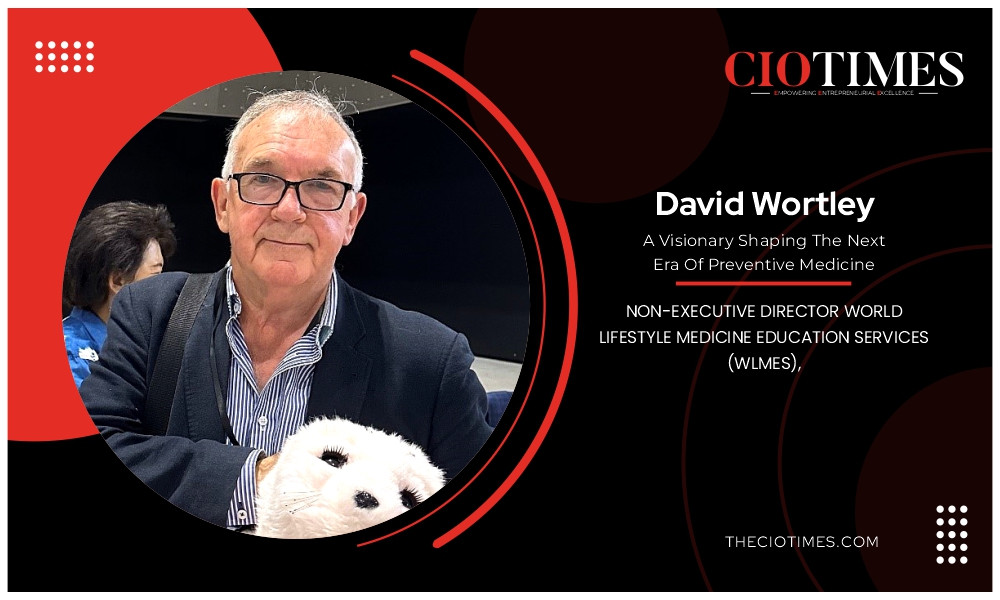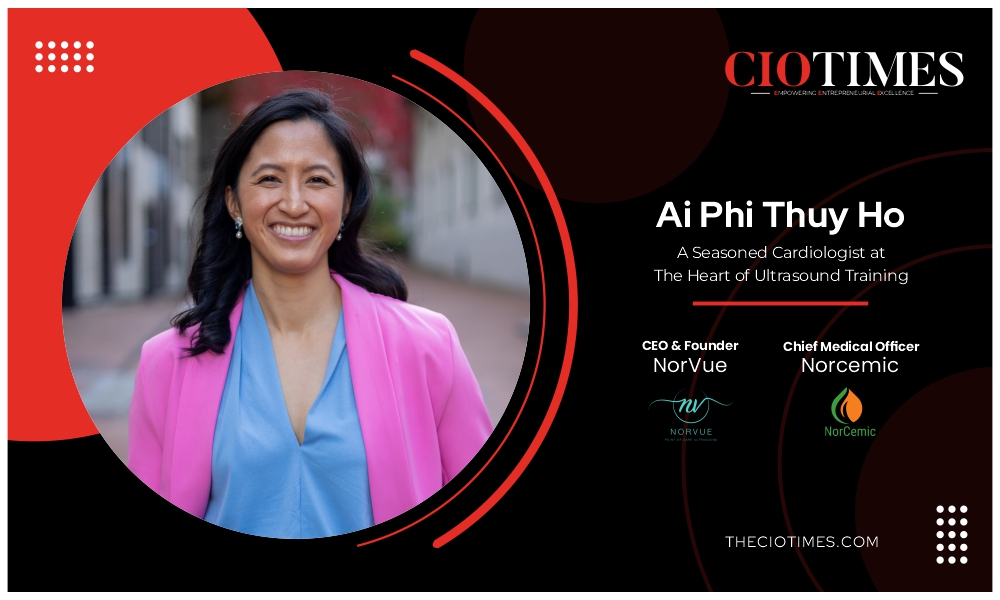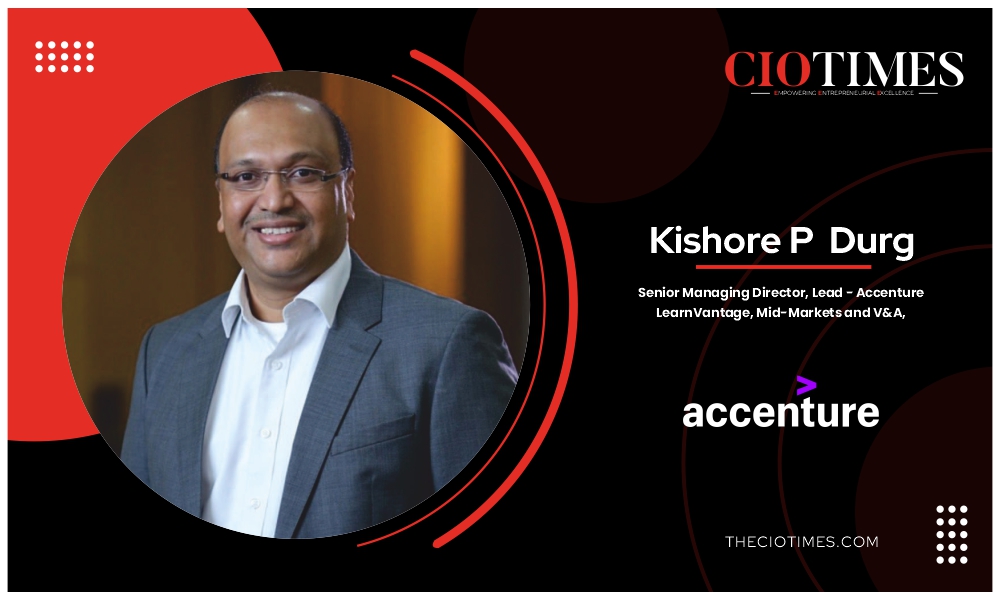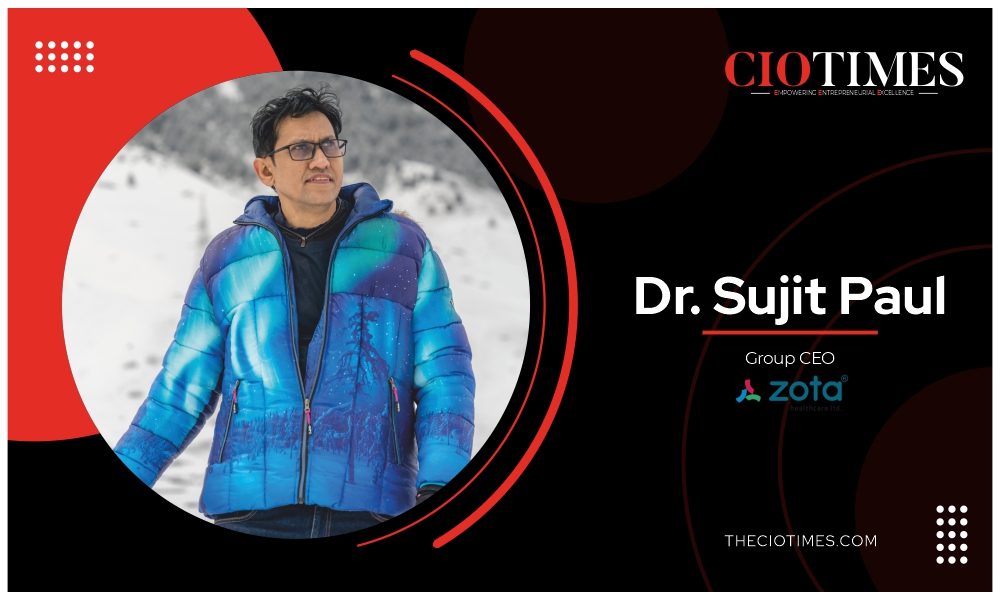David Wortley is a globally recognized thought leader in digital health and preventative medicine, specializing in the intersection of technology and healthcare innovation. As the Vice President of the International Society of Digital Medicine (ISDM) and the Non-Executive Director of World Lifestyle Medicine Education Services, he plays a pivotal role in advancing digital therapeutics and AI-driven healthcare solutions. He is also a sought-after keynote speaker at international conferences, where he shares insights on AI, digital twins, and enabling technologies in sustainable public health. His expertise in gamification and immersive technologies has positioned him as a leading advocate for personalized health management, helping individuals and organizations harness digital tools for improved well-being.
An Impactful Career
David’s professional journey has been defined by a deep commitment to bridging innovation, education, and impact. With a background spanning healthcare leadership, business development, and digital innovation, he has worked across sectors to help organisations deliver meaningful change. Over time, his passion for preventative health and wellbeing led him to the field of lifestyle medicine—a domain that aligns medical practice with real human outcomes.
A defining element of David’s journey has been his own health transformation. Over the past 11 years, he has actively managed his health through the use of wearable technologies and gamified behavioural strategies. As a 75-year-old man who takes no medication and walks five miles every single day, he is living proof that lifestyle change—when sustained—is powerful and possible. This lived experience, combined with his strategic work, fuels his leadership role as Non-Executive Director of the World Lifestyle Medicine Education Services (WLMES), the commercial arm of the British Society of Lifestyle Medicine (BSLM).
Lifestyle Transformation
David’s personal journey with wearable tech and lifestyle optimisation started more than a decade ago, long before these tools became mainstream. He saw firsthand how tracking his activity, sleep, nutrition, and stress could drive real, lasting change. It wasn’t just the data—it was the engagement. Gamification kept him consistent. Wearables made him accountable. And over time, these digital nudges became life-changing habits.
That experience inspired David to think bigger—what if one could deliver that same transformation to thousands, even millions, through immersive education?
“Lifestyle medicine provides the scientific foundation; immersive technologies provide the human connection, motivation, and scale. Together, they have the power to revolutionise public health and reshape how we deliver wellbeing in both clinical and corporate settings,” he says.
Commitment to Global Healthcare
World Lifestyle Medicine Education Services (WLMES) is the commercial and educational outreach arm of the British Society of Lifestyle Medicine (BSLM). Its mission is to expand access to world-class lifestyle medicine education by working with organisations that want to invest in the health of their people. WLMES offers corporate programmes, immersive learning pathways, and an accreditation framework that enables partners—from health startups to tech companies—to align with evidence-based lifestyle medicine principles.
For David, this work is deeply personal. He believes that true healthcare reform must begin with prevention, education, and empowerment. Whether that’s a multinational providing its workforce with their education as part of a CSR wellbeing initiative, or a health tech firm becoming an accredited lifestyle medicine partner, WLMES is here to help shape a future where healthier choices are easier, supported, and accessible to all.
Meaningful Collaborations
WLMES serves as a vital bridge between evidence-based lifestyle medicine and the organisations that have the power to implement it. It collaborates with healthcare providers, universities, medical schools, and training bodies to embed lifestyle medicine education into their curriculum, continuing professional development, and staff wellbeing strategies.
WLMES’ partnerships are both strategic and practical. It provides tailored programmes that equip health professionals with the tools to engage patients in lifestyle change, and it works with educational institutions to deliver immersive, accredited learning that blends theory with practice. It also supports organisations developing digital health solutions—helping them align with lifestyle medicine principles so they can become accredited WLMES partners.
“By offering scalable education platforms, micro-credentials, and support for organisational transformation, we enable our partners to deliver real, measurable change in health outcomes,” shares David.
Handling Challenges
One of the biggest challenges, shares David, is awareness—lifestyle medicine is still gaining traction outside academic and clinical circles. Many organisations understand the value of wellness but may not yet grasp the evidence-based, structured approach that lifestyle medicine offers. Part of David’s role is to educate and advocate—to translate the science into real-world opportunities for impact.
Another challenge is commercial alignment. As a non-executive director focused on business development, David needs to ensure that WLMES generates revenue without compromising its integrity. They overcome this by developing partnerships that are mission-aligned, and by offering tangible value—such as accreditation, education, and engagement tools that support workforce wellbeing and enhance partner credibility.
“Having lived the benefits of lifestyle medicine myself, I’m able to speak from both professional and personal experience, which helps build trust and relatability in conversations with partners and sponsors,” says David.
Barriers to Adopting Lifestyle Medicine in Mainstream Healthcare
David says integration is often hindered by structural inertia and a medical model prioritizing treatment over prevention. Most healthcare systems are designed to react to disease, not to empower patients before illness strikes. Time constraints, limited reimbursement models, and lack of training in behavioural change also make it difficult for clinicians to practise lifestyle medicine.
To address this, WLMES promotes education at every level—from early medical training to continuous professional development—so that clinicians see lifestyle medicine as essential, not optional. It also works with policymakers and healthcare leaders to highlight the cost-effectiveness of prevention and the clinical outcomes associated with lifestyle interventions.
Technology, too, is helping shift the tide. As it helps integrate wearables, digital health records, and remote monitoring into the healthcare experience, it becomes easier to track lifestyle data and make it part of clinical decision-making.
Gaining Global Popularity
Lifestyle medicine is rapidly gaining global traction as the burden of chronic disease intensifies and the limitations of reactive healthcare become undeniable. Countries around the world are recognising the value of prevention-first strategies—not only for improving health outcomes, but also for reducing healthcare costs and enhancing productivity.
Globally, we’re seeing lifestyle medicine being integrated into public health policy, medical school curricula, and digital health innovation. There’s a growing appetite from both public institutions and private enterprise to move upstream and invest in what truly drives health—lifestyle behaviours.
WLMES also collaborates closely with the World Lifestyle Medicine Organisation (WLMO). WLMO is a registered civil society in Geneva, made up of a 46-member General Assembly, each national society representing Lifestyle Medicine in their regions. Membership is drawn from North and South America, Europe, Australasia, Asia, and Africa, each implementing Lifestyle Medicine in their own unique way, whilst adhering to the evidence base of the 6 pillars of Lifestyle Medicine. Lifestyle Medicine is therefore now a global movement, with WLMO at the forefront of regional development and implementation. WLMES continues to work closely with WLMO members regarding the expansion of Lifestyle Medicine education and services.
Immersive technology is also playing a pivotal role in that evolution. Tools like virtual reality, AI-based health coaching, gamified wellness platforms, and biometric wearables are transforming how people learn, engage, and stay accountable. These technologies can bring the principles of lifestyle medicine to life—making education more experiential, personalised, and impactful.
“At WLMES, we’re exploring how to incorporate immersive and other technologies into our learning models so that behaviour change is not only taught, but experienced. Whether it’s a VR simulation of a patient conversation or an AI-guided self-reflection journey, these tools are not just adjuncts—they’re catalysts for transformation,” says David.
Staying at the Forefront
WLMES’s approach to staying ahead in both research and educational methods is grounded in three pillars: evidence, innovation, and engagement.
First, it remains closely aligned with the British Society of Lifestyle Medicine and the global network of academic partners leading research in this space. This ensures that all its educational offerings reflect the latest clinical guidelines, emerging science, and real-world outcomes.
Second, WLMES is committed to pedagogical innovation. Education should be engaging, not overwhelming. That’s why it is constantly evolving its delivery models—using microlearning, scenario-based simulations, community-based discussion forums, and, increasingly, immersive tech to bring content to life.
Third, WLMES listens. The organization consults with learners, healthcare providers, employers, and industry partners to understand their needs and refine its approach. In a world flooded with content, relevance is everything.
“Our programmes are designed to be not only evidence-based but practically usable by time-poor professionals and organisations. By maintaining this dynamic balance of science, storytelling, and smart delivery, we ensure WLMES remains a leader in the field,” asserts David.
Strategy for Efficiency
David believes that accessibility and effectiveness go hand in hand. So WLMES is designed to meet learners where they are—geographically, digitally, and professionally.
One of its most innovative strategies is its Accredited Partner Programme, which enables organisations—whether they’re digital health platforms, wellness startups, or healthcare providers—to embed lifestyle medicine principles into their offerings and receive formal recognition for doing so. This creates a ripple effect, extending its impact far beyond traditional classroom settings.
WLMES also offers corporate packages that align with CSR and employee wellbeing strategies, enabling companies to support staff health while strengthening engagement and productivity.
Its modular, micro-credential courses allow learners to absorb content in bite-sized, flexible formats that fit around their lives. And WLMES is actively exploring AI-driven personalisation—delivering content that adapts to the learner’s behaviour, goals, and preferences.
In everything the organisation does, the goal is to remove friction, enhance relevance, and support the journey from knowledge to sustained behaviour change.
Measuring Impact for Positive Change
WLMES believes education should lead to transformation, not just certification. That’s why it works with partners to establish clear impact metrics tied to both learning outcomes and health behaviours.
At the individual level, it tracks improvements in knowledge, confidence, and behaviour change among health professionals and corporate learners. At the organisational level, it assesses programme engagement, retention, and satisfaction—alongside shifts in wellbeing indicators like absenteeism, productivity, or health claims.
WLMES also works with clinical partners to assess the downstream effects of lifestyle medicine education on patient outcomes—whether it’s improved metabolic markers, reduced medication use, or enhanced quality of life. The real-world data is compelling: lifestyle interventions, when applied consistently, work.
“As we integrate more technology and AI-driven insights, we’ll be able to further personalise content and capture real-time behavioural feedback—helping us demonstrate ROI for both health systems and employers,” feels David.
Words of Experience
David shares the following advice for organisations and leaders looking to implement lifestyle medicine principles in their workplace or services:
Start by treating health as a strategic asset, not a perk. Organisations that embed lifestyle medicine principles into their culture—from leadership to line managers—see a ripple effect: greater resilience, reduced burnout, improved retention, and a stronger brand reputation.
I would also say: don’t try to reinvent the wheel. Partner with experts. WLMES provides evidence-based education, accreditation, and implementation support. Whether you’re a corporate employer designing a wellbeing strategy or a health tech company wanting to align with clinical best practice, we’re here to help you scale safely and smartly.
And finally, lead by example. I’ve walked five miles every day for the last 11 years, and at 75, I take no medication. When well-being becomes part of your leadership identity, it inspires others to follow.
Trends Redefining the Industry
We’re entering the age of precision lifestyle medicine—where behavioural science meets digital innovation to deliver deeply personalised, data-driven, and emotionally resonant health education.
Future trends David foresees include:
- AI-enhanced coaching that adapts dynamically to user inputs.
- Immersive VR simulations for professional training and patient empowerment.
- Smart wearables integrated with learning platforms to turn health data into actionable insights.
- Digital twin models allow patients to visualise the long-term impact of lifestyle choices.
These technologies, he says, won’t replace human care—they’ll enhance it. They’ll help health professionals and individuals alike make better decisions, faster, and with more confidence.WLMES is at the forefront of this evolution—bringing scientific credibility, educational rigour, and behavioural insight to a rapidly changing landscape.
Gearing for Growth
For David and WLMES, this year is all about growth, partnerships, and visibility.
The organization is scaling its Accredited Partner Programme globally and deepening its relationships with forward-thinking organisations that want to lead in workplace wellbeing, digital health, or healthcare innovation. It is also launching new corporate learning products that make lifestyle medicine education both accessible and impactful at scale.
The next key event in that journey is the annual BSLM conference, which is being held in Brighton on September 18th – 20th (https://bslm.org.uk/events/bslm-2025-annual-medical-conference/). The BSLM annual conference is always very well attended, with hundreds of delegates and speakers from around the world. Last year’s conference in Newcastle upon Tyne was recognized as one of the best conferences in the world. As well as being very well attended, the range and quality of the speakers from around the globe are exceptional.
The BSLM conference, shares David, also provides a great opportunity for organisations with lifestyle medicine products, services, or practices to showcase their work in the exhibition area, which is always very busy and a productive way to raise visibility and build new contact networks. Whether for the BSLM annual flagship conference or strategically, WLMES is always looking for sponsors, collaborators, and partners who share its vision. If an organisation is ready to lead the next chapter of health innovation—WLMES is ready to work with them.
“Personally, I’ll continue to use my role—and his own health journey—to raise awareness around the power of lifestyle medicine, healthy ageing, and the need for commercial models that deliver both wellbeing and sustainability,” concludes David.
Quote for Feature
“At 75, I take no medication, walk five miles a day, and am living proof that lifestyle medicine works. Now, through WLMES, I’m helping organisations harness that same power—to transform lives, workplaces, and healthcare itself.”
Quote: “Lifestyle medicine is not just an alternative—it’s a vital evolution of care.”




